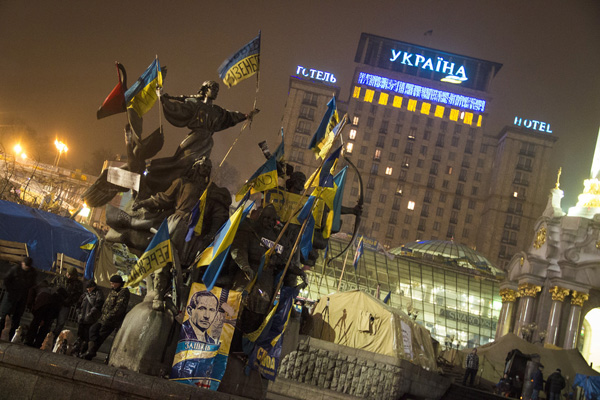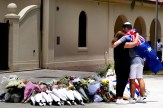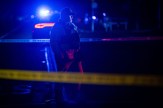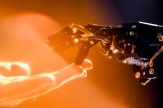On the ground, alumnus reports on Ukraine revolution

Violent protests, political upheaval, and Russian involvement have thrust Ukraine into the international spotlight, and Northeastern alumnus and journalist Dan Peleschuk has been sharing the story with the world from the conflict’s epicenter.
Peleschuk, AS’09, is a Moscow-based senior correspondent with the Global Post, an online U.S. news organization that has dispatched him to report from Kiev on three occasions since December. His on-the-ground reporting has produced news articles on protestors’ seizing control of the capital as well as memorial services held for those killed in clashes between anti-government protestors and police forces last month.
“I think the most strikingly unexpected thing for me was experiencing the fallout of the clashes,” Peleschuk said of the funerals. “I haven’t experienced any moment as powerful, saddening, and in some ways empowering for the Ukrainians as they honored those ‘fallen heroes’ as they called them.”
Protests in Ukraine began in November when now ousted President Viktor Yanukovych abandoned signing an association agreement with the European Union in favor of seeking closer economic cooperation with Russia. Since then, protests and police response have escalated and turned deadly for the first time in January. Violence continued in February, leaving at least 80 people dead and more than 1,000 injured. Yanukovych was ousted on Feb. 23 and an election is scheduled for May.
Russia’s involvement with the unrest heightened over the weekend. Despite warnings from U.S. President Barack Obama and European leaders, President Vladimir Putin sent troops to the Crimean Peninsula to protect its interests and loyalists living there. According to reports on Monday, Ukrainian officials claimed Russia had issued ultimatums to Ukrainian forces in Crimea to surrender. In a statement on Monday, Obama said Russia is on “the wrong side of history.”According to reports, Putin on Tuesday said Russia reserved the right to use force as a “last resort” and described the crisis in Ukraine as resulting from an “unconstitutional coup.”
Mitchell Orenstein, professor and chair of Northeastern’s Department of Political Science, said this escalating situation has the potential to begin a new Cold War between Russia and the West.
“This is the most serious security situation to develop in Europe since the end of the Cold War,” Orenstein said, “and basically the same policies from that time, more or less an isolation of Russia, are going to be pursued.”
Peleschuk, for his part, has reported primarily from Kiev’s Independence Square, the central location of the demonstrations. He said protestors there continuously expressed their enthusiastic defiance against Yanukovych’s government and Russian influence.
“There is this enduring sense of defiance, which is in some ways part of the Ukrainian character,” Peleschuk said, “and recently emotions have stirred from defiance to determination. Protestors are saying, ‘We are going to see this through, we have sacrificed a lot, and there is no turning back now.’”
Peleschuk is quite familiar with this corner of the world. He traveled there in the summers as an undergraduate at Northeastern and while attending graduate school in Toronto. He also has a personal connection to this region; his grandparents emigrated from Ukraine during World War II, and his family history has taught him a great deal about the country’s culture.
“Journalism was something that interested me when I started university and was the perfect way to explore the region I’m familiar with culturally more in depth,” Peleschuk explained.
He said his journalism professors and fellow classmates at Northeastern greatly influenced his maturation as a journalist, but when it comes to covering a revolution there are some things one can’t learn in a classroom.
“It is a trial by fire,” Peleschuk said. “Nothing can really prepare you for it besides keeping an open mind, a sense of professionalism, and knowing how much work you have to do. It can get very stressful physically and mentally.”






